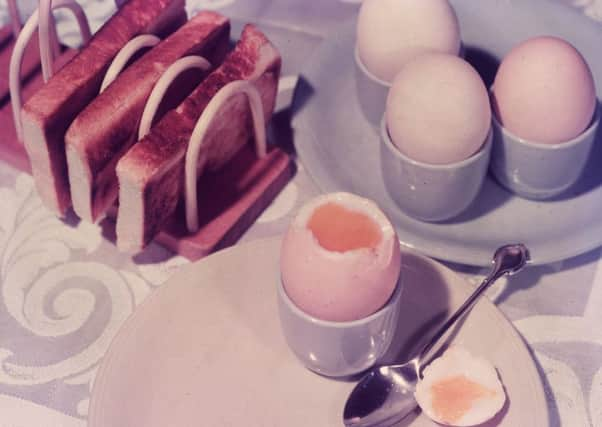Stephen Jardine: It's no yolk: Eggs are officially good for us


I’m currently reading Eggs or Anarchy by food writer William Sitwell. It tells the heroic story of Lord Woolton who as food minister during the Second World War went to extraordinary efforts to keep Britain fed. As the title suggests, there were real fears shortages could tip the long-suffering population over the edge and nothing was missed more from the dinner table than the egg, as dried egg powder proved to be a poor substitute.
When rationing ended, with a little help from the “Go To Work On An Egg” advertising campaign starring comedian Tony Hancock, egg production was once again booming, with most people eating on average almost half a dozen a week.
Advertisement
Hide AdAdvertisement
Hide AdThen came the dark years. Misinformation about the link with cholesterol combined with a scare surrounding the supposed prevalence of salmonella to crack our love affair with the egg.
It’s taken 30 years of hard work to repair that damage, but the Food Standards Agency has now confirmed what the sensible already knew – eggs are good for us.
The FSA now says it is safe for the elderly, the young and pregnant women to eat raw or runny eggs stamped with the British Lion quality mark without risk of food poisoning.
The move follows a review of new scientific evidence. Whatever the risks back in 1988 when Edwina Currie erroneously declared that “most” of the eggs in Britain were affected by salmonella, the industry is now more regulated and transparent than ever.
Improved hygiene across the industry and higher welfare standards for birds have led to a rise in free range and organic egg production, with all supermarkets promising to stop selling eggs from caged birds within the next eight years.
Eggs are an excellent source of inexpensive, high-quality protein and are also rich in nutrients that promote heart health. And at a time when we are all wondering about what goes into our food, the egg offers a simple answer: crack it open and the ingredients are inside for all to see.
In many ways they are the ultimate convenience food. Eggs store well and offer so many quick options to cook. Ten minutes after getting home you can be sitting down to fried, boiled or poached eggs or even a delicious omelette. They are also one of the few foods that has a place across the day at breakfast, lunch or dinner. From birthday cakes to spaghetti carbonara, from Sunday brunch to sitting on top of steak and chips, it is one of the healthiest, most versatile and convenient things we can possibly eat.
So let’s crack on with putting food scares and confused science behind us and the egg back where it belongs at the centre of food life.